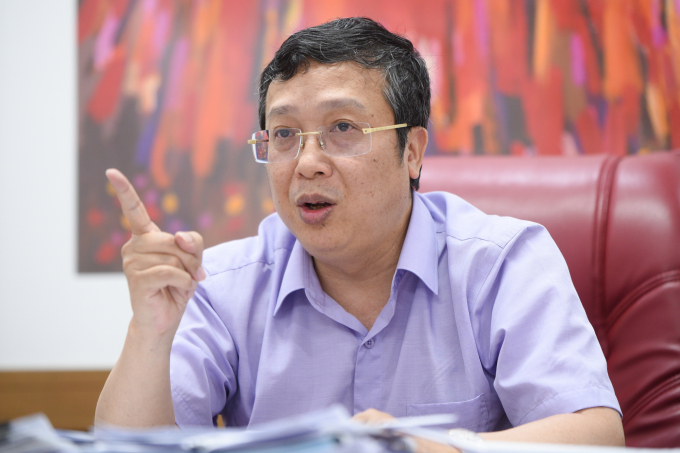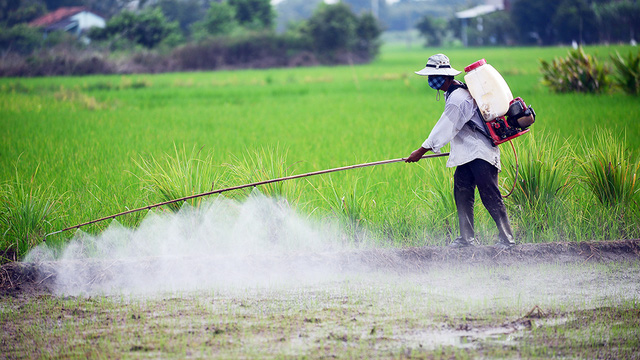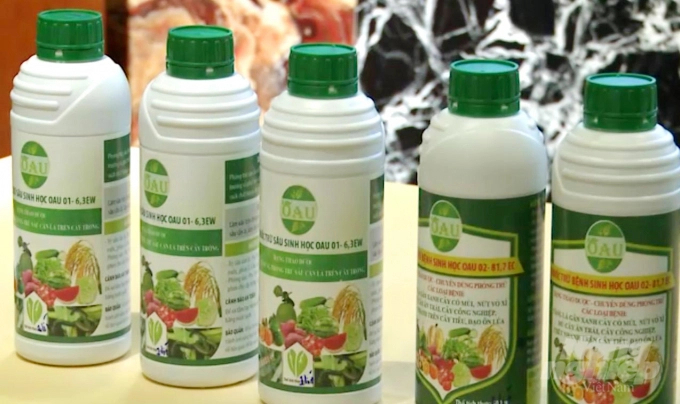June 19, 2025 | 15:25 GMT +7
June 19, 2025 | 15:25 GMT +7
Hotline: 0913.378.918
June 19, 2025 | 15:25 GMT +7
Hotline: 0913.378.918

Director Hoang Trung, Department of Plant Protection, affirmed that pesticide inspection and quality control are carried out very strictly. Photo: Tung Dinh.
There are more than 32,000 pesticide trading establishments nationwide, 85 processing and pesticide factories. In 2020 Vietnam imported nearly 60,000 tons of pesticides, but the import amount tends to decrease because this figure was reduced to only 56,000 tons in 2021.
“Pesticide inspection and quality control are carried out very strictly. All imported batches are 100% inspected. The results show that the percentage of pesticides unable to meet the standards is very low, only 0.017% in 2020, equivalent to 3 - 4 unqualified batches out of 7,000 imported batches," said Director Hoang Trung.
Apart from the inspection, the Department of Plant Protection also demands all businesses and agents possessing pesticides with trade names on the list to be responsible for coordinating with localities, providing guidance and organizing training courses so that people can use pesticides reasonably.

The Department of Plant Protection coordinates with its branches to organize hundreds of training courses for hundreds and thousands of people every year. Photo: TL.
The Department of Plant Protection has regularly reviewed and removed toxic pesticides in accordance with the law, including pesticides listed in Appendix 3 issued annually under the Rotterdam Convention; pesticides warned and banned by FAO and WHO; pesticides which Vietnam has sufficient scientific and technical evidence that will affect human health and the environment, and drugs that are assessed as having reduced biological effectiveness in actual use.
Up to now the Department has removed 14 compounds with quantities equivalent to 1,706 trade names and 1,258 substance contents of pesticides. Each pesticide has only one specific content now, not one product but many different contents as before to avoid fraud and confusion for people.
The Department of Plant Protection’s quick and thorough involvement is met with reactions from not only businesses and associations but also related countries. However, thanks to the firm and methodical implementation, with sufficient evidence and clear arguments, the decisions of the Department of Plant Protection still stand.
From 2016 to now, the number of active pesticides in Vietnam has been maintained at approximately 400 types. Before 2016 there was a period when the number of trade names went up to 6,000 - 7,000, but from 2016 up to now, this number has been maintained at 4,000 - 4,100, specifically 4,074 at the moment.
According to FAO statistics, Vietnam’s average amount of pesticides used is 1.76 kg/ha with an estimated cost of USD 120/ha, currently at the bottom list of the region. These results are achieved thanks to precise actions and strict input control from the Department of Plant Protection.
Concerning the matter of increasing domestic pesticide production, Mr. Hoang Trung said that, regardless of the industry, if it can be proactive in production methods and plans, a lot of benefits are sure to follow.
“Previously, we did not encourage domestic production of pesticides in consideration of environment protection. Therefore, development plans and strategies have never mentioned the promotion of the domestic pesticide industry, even for biopesticide,” said the Director of the Department of Plant Protection.
Vietnam has not been able to research and produce any pesticide compounds, all are 100% imported. It is now time to reconsider because importation is facing many difficulties due to the Covid-19 pandemic or conflicts between countries, not to mention the price has skyrocketed.
The Department of Plant Protection has developed the program "Development and use of biological pesticides”, established a workplan and signed contracts with twelve leading enterprises in biopesticides.
Among the present list, approximately 18.26% are biopesticides, equivalent to 734 trade names. Director Hoang Trung said, "The goal is that by 2025, the proportion of biopesticides in the list will reach 30% and its usage must account for 20% of the total annual use of pesticides".
The Department of Plant Protection is also encouraging enterprises to research and register more new generation biopesticides, especially those that can be manufactured domestically. There are several products borne from the cooperation between companies and institutes such as Omon Rice Research Institute and Plant Protection Research Institute (PPRI).
“The policy is that whatever the country can actively do will be done first. The Department of Plant Protection will facilitate the process at maximum from testing, evaluation, recognition, listing and issuance of certificates for registration of usage so that businesses can have a complete set of products to serve agroproduction.”
The twelve businesses in this program will acquire a plan design to open 120 training courses and seminars, focusing on key crops of each locality especially places that concentrate on developing organic agriculture.

Biopesticides are well-received at markets.
Translated by Samuel Pham

(VAN) The waste of resources from agricultural by-products and the situation of counterfeit and poor quality goods in production causing losses of thousands of billions were pointed out by the National Assembly deputy.

(VAN) After 5 years of implementation, the CAI initiative has helped coffee growers change their farming practices, moving toward responsible agriculture that meets global export standards.

(VAN) The primary prerequisite for the comprehensive and robust integration of Vietnam's livestock sector into the global value chain is the establishment of a disease control system.

(VAN) The results of national programs are essential for establishing a contemporary livestock sector that is well-equipped to meet the demands of both domestic and international markets, with robust biosafety standards.

(VAN) The UNESCO Global Geopark revalidation of Non nuoc Cao Bang and the transition to a two-tier administrative model are presently undergoing a pivotal moment in Cao Bang, the northernmost province of Vietnam.
/2025/06/13/5330-2-004539_953.jpg)
(VAN) Changing policy mindset and removing investment barriers are urgent requirements to open up new development space for enterprises in the agricultural sector.

(VAN) The areas include the restoration of five million hectares of marine ecosystems.